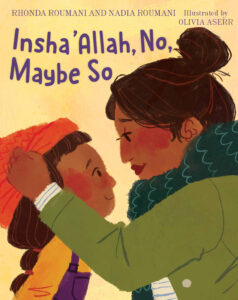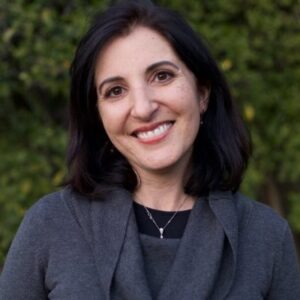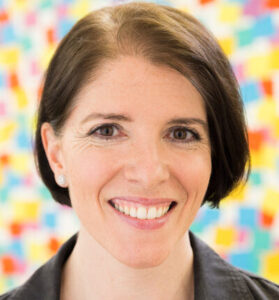Sally Morgridge, editor at Holiday House, interviewed the creators of Insha’Allah, No Maybe So to look at their process, purpose, and product:
- Discovering the real meaning of “Insha’Allah” seems to be a bit of a rite of passage for Muslim and Arab kids around the world. Do you have a specific memory from your childhood where you finally put the pieces together? Do you have memories of your own children going through the same thing?
RHONDA: I don’t have a specific memory. I think my parents were especially good at saying no, so we didn’t quite experience the word insha’Allah as no from our own parents. I have experienced the “no” part of Insha’Allah more with my own kids, when they challenge me and my husband when we say it to them—and within our community. I do love hearing people’s stories about how they thought insha’Allah meant “no” growing up. It’s a sort of cultural bond because whether the person is religious or non-religious, whether they are Arab or from a part of the world that uses the word insha’Allah, there’s a moment of recognition, of a common lived experience with a simple word. When my sister-in-law was a little girl, she once asked her mom when her dad would be returning home from his trip. When her mom responded, “tomorrow, insha’Allah,” she burst into tears. When her mom asked her why she was crying, she responded, you said insha’Allah, that means baba isn’t coming home!” That one might sound a little dark, but we laugh when we tell these stories. They’re small moments of misunderstanding, of acknowledging we see each other, that we are experienced similar things growing up. And there’s often a lot of laughter associated with those moments.
NADIA: From a very early age, I really took the idea of insha’Allah to heart. This might be a bit dark… but my father was the only physician on both my dad’s side of the family and my mom’s. So when someone would get sick on either side, many times they would stay with us for a while as their health plan was sorted out. When we were young, we had two cousins, who lived in the Syria and Lebanon, who came to the states to get treatment for cancer. Watching them both go through treatment, and both ultimately lose their lives to cancer at such a young age, really impacted me and my understanding of life and uncertainty. So early on, I really believed in the idea of insha’Allah, that we do not have control of what happens to us, and we need to live each day as a gift. We need to make exciting and ambitious plans, but know that in the end, God may have other plans for us.
- How was the process of co-authoring a book with your sister?
NADIA: Simple and complicated at the same time. Simple in that our story came together quickly. Although we ended up going on some exploratory tangents with new characters and other plot lines, we came back to our original script, which is the one we both loved. I had brought the initial idea of the book to Rhonda after I tried to explain the concept of insha’Allah to my newborn. I shared the line that appears in the book about “you were my insha’Allah” with my daughter, and then quickly relayed that to my sister as possibly the start of a children’s book. Shortly after that Rhonda had a clear idea for a story line with Ranya’s debating with her mom and somehow those two pieces fell together quickly and effortlessly.
Thankfully Rhonda was already an author and had done the hard work of finding an agent. So I didn’t have to worry about any of that – as Rhonda liked to remind me. 🙂
The complicated part is that families are messy, and working with family, as I’m sure almost all siblings who work together can attest to, can be challenging because the line between your work and your relationship is blurred. What might be a harmless debate over an edit, or scheduling time to speak, can turn into a heated conversation about how you “didn’t let me borrow your hairbrush when I was 10”… But that is family – the loving, the joyful and the messy.
Unfortunately we live on opposite sides of the country and we still have not had a chance to truly celebrate the book’s release together! We are hoping we will have a chance to do that this summer.
RHONDA: It was fun and frustrating and eventually very gratifying. We are very different and our work environments are also very different. Nadia usually runs meetings and leads large groups of people—so she’s used to being in charge. I usually work on my own as a writer—or maybe with an editor. So my work is more solitary. So just like we put two concepts together, we had to figure out how to also work on something so personal together, while respecting each other’s spaces and ways. It was a learning process. We might have had a few arguments along the way. But I think we both learned a lot about each other during this process. I didn’t think that was even possible at our age.
- Publishing a book for children is very much in the spirit of the word “Insha’Allah,” as a book is like a concrete, tangible expression of your hopes and dreams. What do you hope that children take away from Ranya’s story?
NADIA: Uncertainty is such a complex concept for children – for adults too! We hope this book helps open a conversation with children about uncertainty, and why we can make the best plans, but sometimes they may fall through. We also hope that it opens a playful conversation between kids and parents about making earnest intentions, even if uncertainty is part of life – especially by putting parents on the spot about their true intentions when they say insha’Allah.
RHONDA: What Nadia said! I hope kids also understand that as parents, we don’t mean to deceive them. Sometimes we don’t know the answer, so we say insha’Allah. I also hope we remind parents of the beauty of this word and that, if we want to say no, we should just say no. The word Insha’Allah isn’t supposed to be a “get out of the question” free card.
- As relatively new picture book authors, it must have been an interesting experience to sit back and watch an illustrator bring your beloved characters and their world to life. What is your favorite illustration in the book?
RHONDA: This is a hard question because there are so many details that I absolutely love. I love the spreads of Ranya as she presses her mom with questions. I think my favorite spread is the two-page spread of them walking home, as they pass the MARKET PLACE. It reminds me of how my own kids can talk and talk and talk – and press and press and press about something– and I’m just trying to do something simple, like get home. It just felt so real. But the final picture of Ranya is just perfect. She’s such a za’ara – a rascal—and that last illustration captures her perfectly.
NADIA: It was such a fascinating process. I was so surprised to learn that you hand over the script, without any illustration notes or direction, and then the illustrator takes it from there. But now having been through the process, that makes so much sense. The illustrator brings their imagination, vision, brilliance and ideas to the book and makes it their own as well. Olivia did just that and more. Their illustrations captured Ranya’s spunky personality and her loving interactions with her mom. It is so hard to pick just one illustration, but I’ll share my favorite ones, and the reasons why
– I laughed out loud when I saw the way she illustrated Ranya’s parents standing next to one another. I giggled at their height difference and their facial expressions, and didn’t know if that is how Olivia imagined they might be in reality or simply in Ranya’s mind. Either way, I loved that one.
– I adore the full two-page spread of Ranya and her mom walking in front of the marketplace. The colors, the details, the surrounding activity, the colors and the warmth.
– I love the spread of Ranya and her mom baking cookies. I now bake with my 2.5 year old daughter and this spread felt so familiar – it was just missing the cookie dough on her fingers and nose 🙂
– and I absolutely love the cover! It so beautifully captures a mother-daughter’s special connection.
Published May 14th, 2024 by Holiday House
About the Book: A sweet and playful picture book about a common Arabic word for life’s uncertainties that will ring true for all families.
Ranya wants to go to the park. “Insha’Allah,” her mom tells her.
But doesn’t that just mean no? Ranya’s mom says “Insha’Allah” when Ranya asks to make cookies. She says it when Ranya wants to sleep over at Jayda’s house. She says it when Ranya begs to go to Disneyland.
This might sound familiar to parents and caregivers . . . It’s hard to know what to say when you can’t promise anything! Sometimes grown-ups say “Maybe” or “We’ll see.” And in millions of Arab and Muslim homes around the world, families use the phrase “Insha’Allah” when talking about the future.
So, what does “Insha’Allah” really mean? In this warmly illustrated picture book, Ranya and her mom tackle the meaning of the powerful phrase and ponder the best way to talk about their hopes and dreams—and maybe, sometimes, the things they want to put off. (Like cleaning up toys!)
Cozy art and joyful, loving characters make this a perfect family read aloud.
A Junior Library Guild Gold Standard Selection
About the Authors:
Rhonda Roumani is a Syrian-American journalist who has written about Islam, the Arab world and Muslim-American issues for more than two decades. She is the author of the middle grade novel Tagging Freedom and picture book Umm Kulthum: Star of the East. Visit her at www.rhondaroumani.com.
Nadia Roumani is a social entrepreneur, coach, consultant, and co-founder of the University of Southern California’s American Muslim Civic Leadership Institute and Stanford University’s Effective Philanthropy Learning Initiative. She is also a Senior Designer with Stanford University’s Hasso Plattner Institute of Design.
Thank you Sally, Rhonda, and Nadia for this fun & insightful interview and sharing your book!



